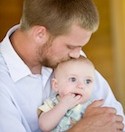Every new born is different; some cute and bald, others with a full head of adorable Elvis styled hair! Each is born with amazing abilities. You may think that all babies do is sleep, cry, poop and eat (with not much of the sleep part going on), but they already have the most amazing brain ready to soak in experiences and learning that will shape their future.
Look at the world through a newborn’s eyes. While in the womb the mother’s body took care of everything for the baby; food and oxygen, and providing a safe cushioned place away from the rest of the world. Once born they are thrust into an environment where everything is new, unknown and different. Suddenly there is light and darkness, air on the skin and movement and noises all around them that are unknown.
The newborn’s brain
Despite a newborn’s small size at birth, their brain is already around 25% of adult size. While a lot of brain development happens in the womb, much of the connecting of neurons and strengthening of these connections happens after birth. The way the brain connects and develops is influenced by the baby’s experiences and interactions with people and their environment. The biggest influence being their primary caregiver, the person they are with the most who is doing the caretaking.
Brainwave trust says,
our genes are not a static blueprint; they can actually alter with experience in the sense that they can be ‘switched on’ or switched off.
Nature and nurture operate together to fashion our brains. Put simply, genetics play their part in brain development but infants need a positive environment, rich experiences and an upbringing where their needs are consistently met for the brain to make all these connections. What all the science and jargon really means is that babies need love, attentive care and affection to flourish.
Baby’s reflexes
Your baby is born with instinctive reflexes. Many are about survival. Some disappear abruptly, usually between three and six months of age, while others are gradually replaced by more intentional behaviour.
A few common ones are…
The grasp reflex – if you put your finger into a newborn’s palm they will grab on to it with a vice like grip.
Mouthing reflex – stroke a newborn’s cheek and they will turn with mouth open ready to feed. They also have a gag reflex to help with choking.
Moro reflex or startle reflex – if your baby is startled such as a door banging loudly shut they may stiffen with head back and fling their arms out straight before bringing them back to their body. It is thought to be a protective reflex.
Stepping reflex – hold a newborn baby up with their feet on a firm surface and they amazingly lift each leg in a stepping motion.
Baby’s vision
Vision is the least developed of the senses at birth. People seem a bit ‘fuzzy’ and the eyes can only see about 20 to 30 centimetres in front of them. They most easily notice movement and high contrast patterns. Babies are instinctively fascinated with the human face. From these interactions attachment starts with face to face contact, an important part of getting to know each other.
What can you do?
It’s important to be present during feeding time whether bottle or breast. Look into your baby’s eyes and smile, talk and sing. Hold or cradle your baby close so they can begin to focus on your face. You should hang mobiles within the baby’s vision range.
Baby’s hearing
Babies can already hear in the womb and there have been studies showing they are born with a preference to their mother’s voice and their own language. Babies respond to the pitch and tone of your voice. Again they are born with an innate interest in language and sounds and you may notice them turning their head or eyes towards sound in the first eight weeks.
What can you do?
Vary the pitch and tone of your voice. Make use of nappy change times to talk and sing.
Listen for and respond to your babies attempts at noises.
Baby’s touch
In the womb the sense of touch is the first to develop. Newborns are extremely sensitive to touch and texture and will feel the lightest of touch on their skin. They can be particularly sensitive to change in temperature which is why you may get a large squawk in protest as cool air hits the bottom at change time. Newborns are particularly sensitive to touch around their hands, mouth and feet.
What can you do?
Be gentle with all your interactions including wiping babies face clean and bath time. Ensure the water is nice and warm without being too hot and that the room is warm that they are bathed and changed in.
Use gentle massage after bath time and go with your baby’s cue of what they enjoy. Massage triggers sensory receptors sending signals to the brain helping it to make new connections.
Have soft textured blankets for swaddling.
Have lots of cuddle time where baby feels your touch.
Baby’s tears
This is how babies communicate. I am cold, hungry, lonely, tired. A tired cry will sound different to a cry of pain and you will start to hear the difference.
What can you do?
Respond quickly and consistently with nurture and care to a baby’s cry. It’s the cornerstone for healthy attachment and emotional development. A baby learns I can trust others, I am safe, I am loved. There is a reason a newborn baby’s cry can be surprisingly loud for such a tiny being, it is designed to be impossible to ignore.
They might be the smallest in the house but are at times the loudest.
The early months will go so fast and soon turn into the early years, so treasure this time. What amazed or surprised you about your new born?
Some useful new baby articles and resources
Find out more about the 8 main reasons your baby is crying.
This article has some great information on how to survive the first 6 weeks with new baby.
Are you feeling a little blue, find out more about the Baby Blues and what you can do.






